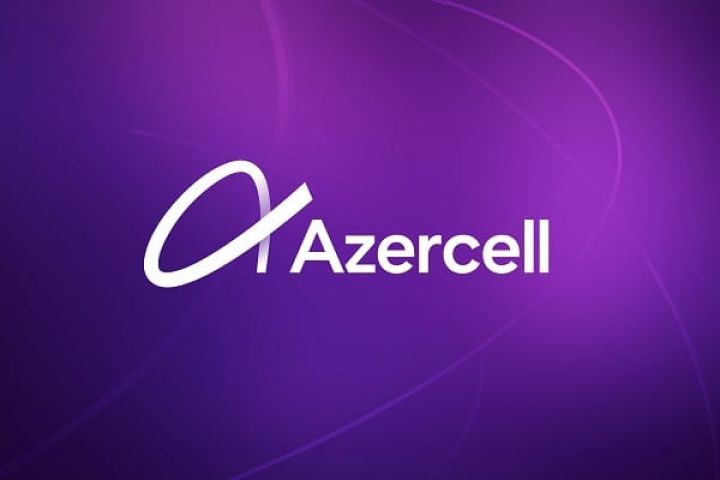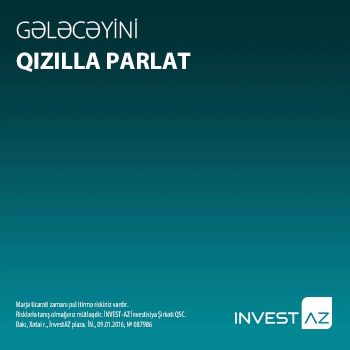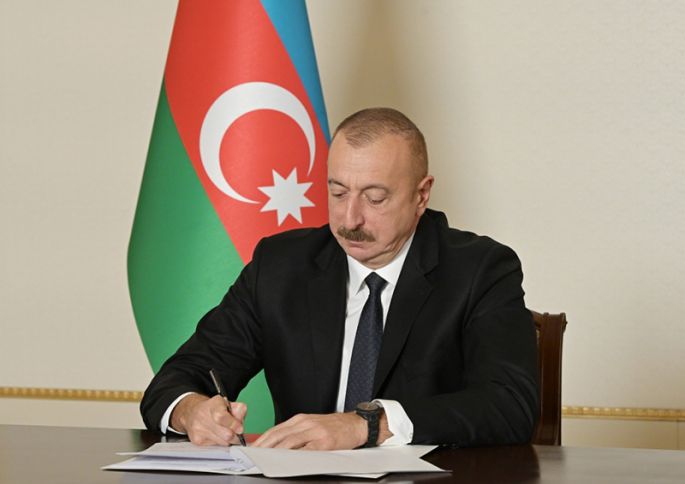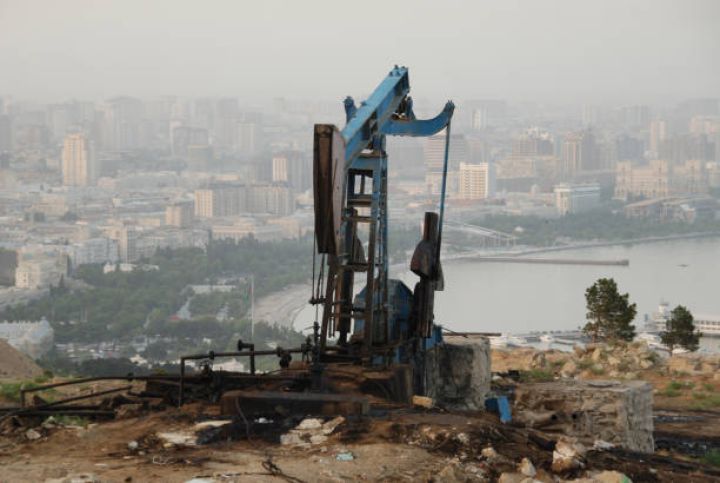Fitch Azərbaycanın reytinqini “pozitiv”ə yüksəltdi
(Fitch Ratings) “Fiç Reytingz” Azərbaycan Respublikasının “sabit” beynəlxalq kredit reytinqini “pozitiv”ə yüksəldib
Oktyabrın 21-də “Fiç Reytingz” (Fitch Ratings) beynəlxalq kredit reyting agentliyi Azərbaycan Respublikasının uzunmüddətli yerli və xarici valyutada reytinqini “BB+” səviyyəsində bir daha təsdiq edərək proqnozu “sabit”dən “pozitiv”ə yüksəldib.
Maliyyə Nazirliyinin yaydığı məlumata görə, Agentliyin hazırladığı hesabatda qeyd olunur ki, Azərbaycanın güclü fiskal mövqeyi, aşağı suveren borcu, yüksək neft və qaz qiymətləri nəticəsində yığılmış iri həcmdə xarici valyuta aktivləri ölkənin reytinq üzrə proqnozunun artırılmasını şərtləndirib.
Reytinq üzrə proqnozun “sabit”dən “pozitiv”ə yüksəldən agentlik Azərbaycan Respublikasının xalis suveren aktivlərini 2022-2024-cü illərdə 14,3 faiz artaraq ÜDM-in 77,6%-nə çatacağını proqnozlaşdırır ki, bu da reytinq qrupunda ən yüksək göstəricidir. Agentliyin press-relizində qeyd olunur ki, işğaldan azad edilmiş ərazilərə ÜDM-in 2%-i həcmində kapital qoyuluşları, habelə yüksək inflyasiya şəraitində artan sosial xərcləri də nəzərə aldıqda, yenilənmiş neft qiyməti proqnozu və qaz qiymətlərinin müəyyən müddət yüksək qalacağı ilə bağlı gözləntilər nəzərə alınaraq 2023-cü ildə icmal büdcənin profisiti son hesabatdan bəri 1,5 faiz artırılaraq ÜDM-in 6,7%-nə bərabər olacağı gözlənilir.
"Qlobal iqtisadi mühitdə cərəyan edən qeyri-sabitlik və yüksək infilyasiya şəraitində “Fiç Reytingz” tərəfindən Azərbaycan Respublikasının uzunmüddətli yerli və xarici valyutada reytinqinin “BB+” səviyyəsində bir daha təsdiq olunaraq proqnozun “sabit”dən “pozitiv”ə yüksəldilməsi ölkə iqtisadiyyatının dayanıqlıq potensialını nümayiş etdirir",- Maliyyə Nazirliyinin məlumatında deyilir.
XXX
Fitch Revises Azerbaijan's Outlook to Positive: Affirms at 'BB+'
Fitch Ratings - London - 21 Oct 2022: Fitch Ratings has revised the Outlook on Azerbaijan's Long-Term Foreign-Currency Issuer Default Rating (IDR) to Positive from Stable and affirmed the IDR at 'BB+'.
A full list of rating actions is detailed below.
KEY RATING DRIVERS
The revision of the Outlook on Azerbaijan's IDRs reflects the following key rating drivers and their relative weights:
HIGH
Improved External Position: High oil and gas prices are further strengthening the sovereign balance sheet. Fitch forecasts the current account surplus will increase 12.1pp in 2022 to 27.3% of GDP, and narrow to 19.3% in 2023 and 12.1% in 2024 (partly reflecting a drop in the oil price to average USD85/b in 2023, and USD65/b in 2024) but still the highest in the 'BB' peer group. Sovereign foreign-currency assets rose to USD52.6 billion at end-June from USD52.1 billion at end-2021. Eighty-six per cent of these are sovereign oil fund (SOFAZ) assets, where the increase in oil and gas revenues in 1H22 more than offset investment losses of USD2 billion. We forecast the net sovereign asset position to rise 14.3pp in 2022-2024 to 77.6% of GDP, the highest in the rating peer group.
Large Fiscal Surpluses: The general government surplus is projected to increase to 10.6% of GDP in 2022, from 4.2% in 2021, driven by energy prices but also reflecting strong non-oil receipts, and moderate expenditure (up 9.3% yoy in 8M22). We have revised up our 2023 surplus by 1.5pp since the last review to 6.7% of GDP, due to our new oil price forecast and expectations of still-high gas prices, while continuing to incorporate capex on territories reclaimed in the conflict with Armenia of 2% of GDP, and higher inflation-related social spending. The fiscal surplus is projected to narrow to 2.3% of GDP in 2024.
Low and Falling Public Debt: The outlook for public finances is also supported by the reinstatement this year of a fiscal rule targeting an annual narrowing in the non-energy primary deficit and capping public debt/GDP at 20% but there remains a lack of detail on any institutional mechanism to support compliance. Fitch forecasts general government debt to fall further to 6.9% of GDP at end-2024, from 16.2% at end-2021. Government on-lending and guarantees totalled 23.2% of GDP at end-1Q22, 77% of which are accounted for by the 2017 restructuring of International Bank of Azerbaijan, and the Southern Gas Corridor project, on which contingent liability risk has reduced.
Azerbaijan's ratings also reflect the following rating drivers:
Fundamental Rating Strengths and Weaknesses: The rating is supported by Azerbaijan's very strong external balance sheet, the lowest public debt in the peer group, and financing flexibility from large sovereign wealth fund assets. Set against these factors are weak governance indicators, lack of predictability of economic policy-making, high banking sector dollarisation, heavy dependence on the hydrocarbon sector, and lingering geopolitical risk of conflict with Armenia.
Macro-Policy Lacks Predictability: There remains a lack of institutional independence, policy predictability and clarity of mandates for the Central Bank of Azerbaijan (CBA) and SOFAZ within the broader exchange rate framework, adding to the risk of policy missteps and disruptive adjustment to a very severe shock. In addition, public financial management is constrained by lack of transparency and weak corporate governance at state-owned enterprises, where we anticipate only gradual improvement despite reform measures to centralise their oversight at Azerbaijan Investment Holding. Fiscal reporting at SOFAZ is more transparent, providing support to Azerbaijan's overall governance performance.
Improved Governance Score, Geopolitical Risk: Azerbaijan's World Bank Governance Indicator (WBGI) percentile score improved to 31.6 in the recent update (covering 2021), from 25.5, accounting for the majority of the improvement in the Sovereign Rating Model (SRM) score since the last review, but its durability could be negatively impacted by renewed conflict with Armenia. Clashes with Armenian troops on 12-13 September were the most severe since the 2020 war, and broadened the conflict from areas in and around Karabakh.
The escalation could be designed to increase Azerbaijan's leverage in negotiations over a political settlement with Armenia, in the context of Russia's focus on its war in Ukraine. Fitch continues to expect Russia will retain its peacekeeping forces at least until the end of the committed period in late 2025, and also that a deal will ultimately be reached between Azerbaijan and Armenia on border demarcation and improving trade and connectivity, but the downside risks to these have increased somewhat since our last review six months ago.
Above-Trend Growth: The non-energy sector drove GDP growth of 5.8% in 8M22, helped by pent-up pandemic demand, higher Russian remittances and a boost to the transportation sector following the war in Ukraine. Growth is set to slow as such tailwinds fade, inflation erodes real income, and the negative output gap closes. Fitch forecasts growth of 4.3% in 2022, falling to an average 2.3% in 2023-2024, near Azerbaijan's trend rate, which is constrained by stagnating energy production. While greater EU demand for Azeri gas, which led to July's agreement to near double exports to the EU by 2027, could result in new investment, the resulting production would take many years to be realised. We see weak prospects for structural reform of the large and inefficient state-sector that constrains economic diversification.
Steady Banking Sector Improvement: While there has been some improvement in credit fundamentals in recent years, the Azerbaijan banking sector is still fairly weak, reflected by Fitch's Banking System Indicator score of 'b'. The non-performing loan ratio fell to 3.5% at end-1H22 (from 6.1% at end-2020), Tier 1 capital is adequate at 16.1%, and the sector has remained profitable. There is low Russian presence in the sector, although correspondent banking relations were moderately disrupted this year. The deposit dollarisation ratio has steadily fallen to 49.3% in August, from 60.4% at end-1H20, but is well above the peer group median of 16.5%.
Inflationary Pressure: Inflation rose 15.6% yoy in September, fuelled by a 21.8% rise in food prices, exacerbated by disrupted imports from Russia and Ukraine. We forecast average inflation of 13.7% in 2022, falling to 9.7% in 2023, helped by the real effective exchange rate appreciation and easing supply-chain disruptions, and to 6.8% in 2024, but still above the CBA target (4%, +/-2pp) and the projected 'BB' median of 4%. Monetary policy transmission is weak and the policy interest rate has been raised only 50bp this year to 7.75%, although there has been tightening of liquidity through reserve requirements and a broadening of CBA's liquidity tools.
ESG - Governance: Azerbaijan has an ESG Relevance Score (RS) of '5' for both Political Stability and Rights and for the Rule of Law, Institutional and Regulatory Quality and Control of Corruption, as is the case for all sovereigns. Theses scores reflect the high weight that the World Bank Governance Indicators (WBGI) have in our proprietary Sovereign Rating Model. Azerbaijan has a low WBGI ranking at the 32nd percentile, reflecting very poor voice and accountability, relatively weak rights for participation in the political process, uneven application of the rule of law and a high level of corruption.
RATING SENSITIVITIES
Factors that could, individually or collectively, lead to negative rating action/downgrade:
- External Finances: Lower energy prices sufficient to have a material negative impact on external buffers
- Macro: Developments in the economic policy framework that undermine macroeconomic stability, such as contributing to a rapid erosion of the sovereign's external balance sheet, with adverse effects on the economy, banking sector and public finances
Factors that could, individually or collectively, lead to positive rating action/upgrade:
- Public Finances: Greater confidence that the strong public balance sheet will be preserved, for example, based on a credible medium-term fiscal strategy, stronger institutional safeguards to the fiscal rule, or prolonged high energy prices
- External Finances: Further strengthening of the external balance sheet, for example, due to sustained high energy prices
- Macro: Improvements in the effectiveness and predictability of Azerbaijan's policy framework, including exchange rate policy, to manage external shocks and reduce macro volatility
SOVEREIGN RATING MODEL (SRM) AND QUALITATIVE OVERLAY (QO)
Fitch's proprietary SRM assigns Azerbaijan a score equivalent to a rating of 'BB+' on the LTFC IDR scale, an improvement from the 'BB' SRM output at the previous review.
Fitch's sovereign rating committee adjusted the output from the SRM to arrive at the final LTFC IDR by applying its QO, relative to SRM data and output, as follows:
- Macro: -1 notch, added since the last review, to reflect relative weakness in Azerbaijan's macro-framework, including from the lack of institutional independence, policy predictability and clarity of mandates for the CBA and SOFAZ within the broader exchange rate framework, and a weak record of preserving the fiscal and external balance-sheet gains from previous energy windfalls. In addition, part of the improvement in the SRM score since the last review was due to temporary macroeconomic factors boosting GDP growth, whereas we assess trend GDP growth as much lower and a relative rating weakness
- External Finances: +1 notch, to reflect large SOFAZ assets, which underpin Azerbaijan's exceptionally strong foreign-currency liquidity position and the very large net external creditor position of the country
Fitch's SRM is the agency's proprietary multiple regression rating model that employs 18 variables based on three-year centred averages, including one year of forecasts, to produce a score equivalent to a LTFC IDR. Fitch's QO is a forward-looking qualitative framework designed to allow for adjustment to the SRM output to assign the final rating, reflecting factors within our criteria that are not fully quantifiable and/or not fully reflected in the SRM.
BEST/WORST CASE RATING SCENARIO
International scale credit ratings of Sovereigns, Public Finance and Infrastructure issuers have a best-case rating upgrade scenario (defined as the 99th percentile of rating transitions, measured in a positive direction) of three notches over a three-year rating horizon; and a worst-case rating downgrade scenario (defined as the 99th percentile of rating transitions, measured in a negative direction) of three notches over three years. The complete span of best- and worst-case scenario credit ratings for all rating categories ranges from 'AAA' to 'D'. Best- and worst-case scenario credit ratings are based on historical performance. For more information about the methodology used to determine sector-specific best- and worst-case scenario credit ratings, visit https://www.fitchratings.com/site/re/10111579.
REFERENCES FOR SUBSTANTIALLY MATERIAL SOURCE CITED AS KEY DRIVER OF RATING
The principal sources of information used in the analysis are described in the Applicable Criteria.
ESG CONSIDERATIONS
Azerbaijan has an ESG Relevance Score of '5' for Political Stability and Rights as WBGI have the highest weight in Fitch's SRM and are therefore highly relevant to the rating and a key rating driver with a high weight. As Azerbaijan has a percentile rank below 50 for the respective governance indicator, this has a negative impact on the credit profile.
Azerbaijan has an ESG Relevance Score of '5' for Rule of Law, Institutional & Regulatory Quality and Control of Corruption as WBGI have the highest weight in Fitch's SRM and are therefore highly relevant to the rating and are a key rating driver with a high weight. As Azerbaijan has a percentile rank below 50 for the respective governance indicators, this has a negative impact on the credit profile.
Azerbaijan has an ESG Relevance Score of '4' for Human Rights and Political Freedoms as the Voice and Accountability pillar of the WBGI is relevant to the rating and a rating driver. As Azerbaijan has a percentile rank below 50 for the respective governance indicator, this has a negative impact on the credit profile.
Azerbaijan has an ESG Relevance Score of '4'[+] for Creditor Rights as willingness to service and repay debt is relevant to the rating and is a rating driver for Azerbaijan, as for all sovereigns. As Azerbaijan has a record of 20+ years without a restructuring of public debt, which is captured in our SRM variable, this has a positive impact on the credit profile.
Müştərilərin xəbərləri
SON XƏBƏRLƏR
- 4 həftə sonra
-
3 həftə sonra
“Coca-Cola” tələbələr üçün “One Idea” innovasiya müsabiqəsinə start verdi
-
5 d. əvvəl
Çindən 1990-cı illərdən bu yana ən aşağı iqtisadi artım hədəfi
-
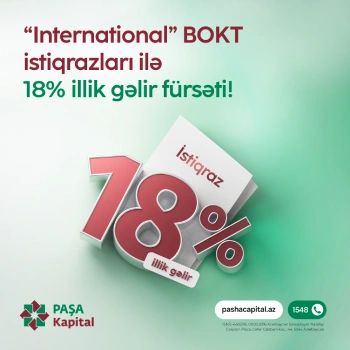
-
11 d. əvvəl
Azercell-in dəstəyi ilə Beyləqanda qızlar üçün STEM dərslərinə start verilir
-
22 d. əvvəl
Azərbaycanın pizza restoranları şəbəkəsi biznesin genişləndirilməsi üçün 4 milyon avro kredit alıb
-
1 saat əvvəl
HONOR Azərbaycanda ikinci rəsmi mağazasını və ilk servis mərkəzini açdı - FOTO/VİDEO
-
1 saat əvvəl
Bu qırmızı dayanmaq üçün deyil, cəmi 4 günlük fürsəti tutmaq üçündür
-
1 saat əvvəl
Yaxın Şərqdə münaqişənin kəskinləşməsi və Dollarının zəifləməsi fonunda qızılın qiyməti yüksəlib
- 2 saat əvvəl
-
2 saat əvvəl
Azercell: Tarif paketlərini yeniləyərək mobil internet və danışıq imkanlarını artırırıq
- 2 saat əvvəl
- 3 saat əvvəl
Son Xəbərlər

Azərbaycanda Vakansiyalar - Azvak.az

Çindən 1990-cı illərdən bu yana ən aşağı iqtisadi artım hədəfi

Bu qırmızı dayanmaq üçün deyil, cəmi 4 günlük fürsəti tutmaq üçündür

Rəsmi məzənnələr açıqlandı

Azercell: Tarif paketlərini yeniləyərək mobil internet və danışıq imkanlarını artırırıq
Ən çox oxunanlar

Azərbaycan neftinin qiyməti 91 dolları keçdi

"Bank of Baku"da iclas keçiriləcək
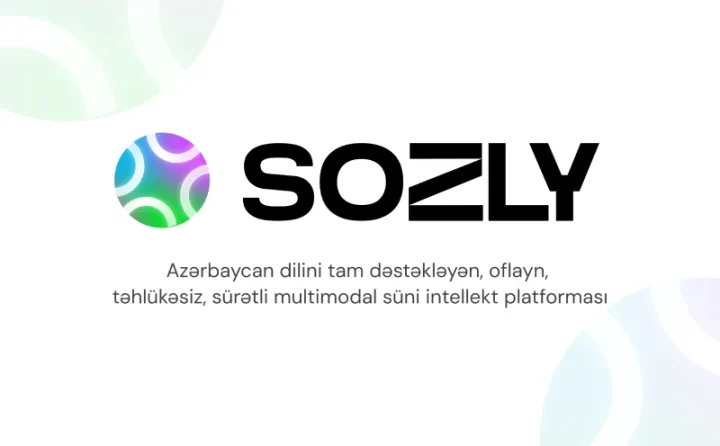
Milli süni intellekt məhsulu sozly.ai istifadəyə verildi

"İran Trampı öldürməyə çalışır"
.webp)
İnvestisiya şirkətlərinin dövriyyələri açıqlandı

"QatarEnergy" LNG alıcıları üçün fors-major hal elan edib

Bakı Fond Birjasının ticarət dövriyyəsi kəskin azalıb

Dolların sabah üçün rəsmi məzənnəsi müəyyən olunub













